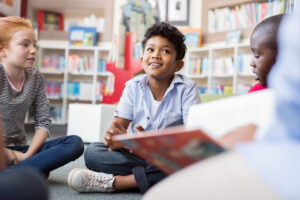Many parents, teachers, and caregivers ask our team around the holiday season what kind of thoughtful and educational gifts can they buy for their specialized learners. We’re here to help! Read our full article for six gift ideas for young children, teenagers and adults.
Great Gifts For People With Dyslexia of All Ages
1. Reading Rulers
There are plenty of reading rulers, or trackers, but the colorful ones will probably be the most useful for your child. They help children hone their reading abilities by underlining, tracking, and highlighting text in a colored tint. Reading rulers reduce perceptual distortions and visual stress while reading. As a result, they reduce fatigue while improving clarity and comfort. All of these benefits help your child read faster and better.
2. Educational Toys And Tools
Many children with dyslexia may find education overwhelming because they feel different from everyone else. Help them find joy in education by making it more engaging and fun. Some of the toys and tools you could look into are:
- Pencil grips to improve grip when practicing spelling
- Child-friendly spelling mnemonic cards
- Phonics flashcards and games
- Multiplication and fraction dominoes
- Small whiteboards and colorful markers to practice spelling without paper
- Highlighting pens to help them single out important information
- C-Pen, which is a portable scanning pen that reads printed text out loud
- And much more!
3. Musical Books For Children
Help your child expand their horizons beyond the homework they are used to. Find a child-friendly musical book and show them that not every skill in the world requires only reading and writing. They can use their minds and hands for so much more. See example here.
4. A Basketball Hoop And Other Sport-Related Gifts
With people spending more and more time in front of screens, it’s great to provide your child with other ways to have fun. A children’s basketball hoop with an accompanying basketball will give them a goal to achieve, and you can even join them once a day to keep things engaging. But basketball hoops are not the only sports-related toys children can enjoy.
You can also get them child-friendly versions of:
- Soccer goals and balls (some even come with a hoop on top!)
- Tennis rackets and balls
- Baseball gloves and balls
- Mini golf clubs and balls
5. Kindle
Kindle is a line of electronic readers (e-readers) produced by Amazon. It can read both e-books acquired through Amazon and external sources. Kindles have a series of benefits for dyslexic readers:
- Text highlighting
- Custom explanatory notes
- Customizable fonts, font sizes, and backgrounds
- Built-in dictionary for minimal interruptions while reading
- The X-Ray function can help keep track of ideas, characters, and essential places in books
There’s even Kindle Kids, explicitly designed for children. So they don’t even have to miss out on its features. We recommend these two Kindle books featuring dyslexic characters, The Girl Who Thought in Pictures: The Story of Dr. Temple Grandin and Finding My Superpower: A Book for Dyslexic Thinkers.
6. An Audiobook Subscription
Audible offers podcasts and audiobooks under subscription or by individual purchases. You can purchase and stream audiobooks and listen to podcasts, radio shows, and audio versions of certain newspapers.
Audiobooks are excellent for people with dyslexia, as they can help bridge the gap between decoding words and assigning meaning. Experiencing the meaning of words through both spoken word and visual recognition improves fluency, builds vocabulary, and supports the development of comprehension skills. One of our favorites is Learning Ally.
Gift Guidelines
If you are trying to give something that is supposed to help someone manage their dyslexia, these are the guidelines you should follow.
- It should have a purpose: the gift should be a tool that will help them long-term.
- It should be intuitive to use: many dyslexic people (and children in particular) find it hard to learn things independently, so the gift should empower them by showing them that they have the same capacity to learn.
- It should be related to their passions: your gift should help them do things they are passionate about.
- It should keep them engaged: the gift should help them stay mentally stimulated.
Above all, a gift should improve somebody’s life. And in the case of people with dyslexia, it should help them manage it. But also remember that dyslexia doesn’t define them as a person. You can give them anything meaningful, even if it’s not directly related to their challenges with dyslexia: collectible figurines, cards, or puzzles. Everything goes if it’s something they feel passionate about.





